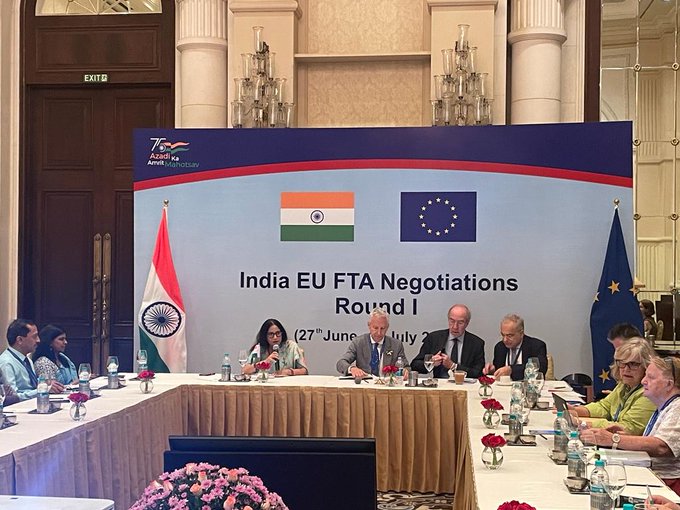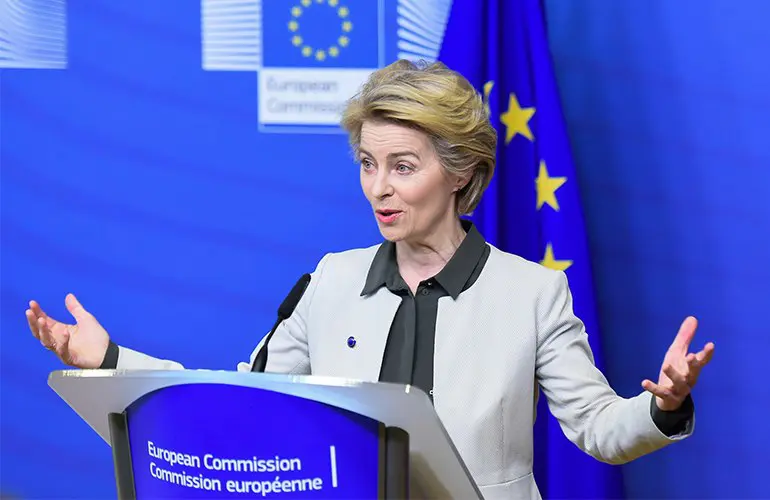Dynamism in EU-India relations key to respond to changing strategic environment

EU and India are rediscovering new pathways to conclude the free trade negotiation (Photo: EU in India twitter)
India’s relations with the European Union over the decades have been built on the principles of cooperation, shared values and common concern for global peace, security, and development. This makes them natural partners as well as factors of stability in the present world order. Together, they are capable of creating a dynamic future for their 1.8 billion people as they have tools and mechanisms to construct a relationship which will develop and progress over the next decades, too.
This relation is also a crucial determinant of international relations, including the governance of international trading system under the World Trade Organisation. In a rapidly evolving international environment, strategic partnership between EU and India is not just about trade and geo-politics, but also about what the future holds for the two largest democracies of the world.
These are challenging times for EU and India, and a closer alignment of interests and a wider usage of the tools of diplomacy will help in bolstering this relationship, especially at a time when the international system is undergoing rapid changes. Looking beyond the well-established trade and economic agenda, the two sides must further strengthen their capacity to work together on issues such as terrorism, promotion of democracy, human rights, and sustainable development.
Ukraine war, a common concern
The ongoing war in Ukraine has upended the existing world order and is reshaping a new world order with unimaginable political, economic, social and national security consequences for all countries. This new situation is also reshaping the global financial system as well as the production, distribution and supply of two of the most critical elements in our daily lives – food and energy. The crisis has led to an unprecedented shortage of food stocks around the world and disrupted the trade that had been going on for decades if not centuries. In terms of energy, it has put the world, but most notably the EU, in a tight corner since the EU has for long been overly dependent on Russia as its principal supplier of energy. The sharp deterioration in the relations between Russia and the EU has led the latter rapidly look for other energy sources.
India’s neutral stance over the Russian invasion of Ukraine may have disappointed EU but one must know how India’s shrewd diplomacy robbed China its ambition to become unipolar centre of gravity shaping and dictating the new world order. India’s position has always been that dialogue and diplomacy are the only way forward. India is most concerned with strategic developments in its immediate vicinity, where a revisionist China actively seeks to redraw the Sino-Indian border, and as such for India its strategic interest is far more important than taking sides in the Ukraine conflict. The problem with Europe is that it painted the Ukraine war as war against all, thus closing doors on diplomacy.
As India’s External Affairs Minister S Jaishankar brilliantly puts it “Europe has to grow out of the mindset that Europe’s problems are the world’s problems, but the world’s problem are not Europe’s problems”. Only if Europe comes out of this mindset shall it realise the new economic, social and security challenges the countries beyond European shores are facing.
New pathways to conclude FTA
EU and India are rediscovering new pathways to conclude the free trade negotiation. The Bilateral Trade and Investment Agreement (BTIA) has strategic importance for EU and India. It is also a geo-political opportunity for peace and security in the Indo-Pacific, and a geo-economic opportunity for opening new areas of economic cooperation. As global power dynamic shifts, it is important that EU and India assert their role in the emerging multi-polar world order with closer economic ties. If EU and India take the FTA negotiation as a matter of strategic and economic urgency, it would help rapidly conclude the ongoing negotiations.
Negotiating a successful trade deal which will impact the lives of more than 1.8 billion people is a complex and complicated exercise and will require visionary approach where ‘rigidity’ has no place and ‘compromise’ becomes the mantra of the negotiating mechanism. It is also important that EU follows the developments in the free trade negotiations between India and Britain, and how the two are set to finalise FTA framework by October.
 India’s stake in EU Green Deal
India’s stake in EU Green Deal
To be able to respond adequately to the challenge of climate change, the world needs transitional and adaptive policies and it is important for EU and India to redesign their existing cooperation to be able to come up with solutions adapted to the new realities facing the world today. The European Green Deal offers unequivocal and binding commitments on climate action, thereby breaking the quandary inherent to climate transitions. With this bold initiative, the EU can shape new types of diplomacy and incentivise climate action across the globe with credibility. The EU Green Deal is an opportunity to strengthen EU-India partnership and foster ties between them in areas that are not yet adequately exploited.
These include clean technologies, enhanced cooperation for technology development and transfer, increased investment in sunrise sectors, knowledge sharing and cleaner finance. As India aims to become a net-zero economy by 2070 and has set a target of installing a non-fossil energy capacity of 500 GW by 2030, India cannot afford not to be a part of this socio-economic and political progress.
By working closely together in the key domain of responses to climate change and global warming in prevention as well as mitigation efforts and capacities, India and the EU can not only play their due role in helping the world overcome an unprecedented challenge, but also emerge as saviours for dozens of least developed nations as well as the small island states that are most vulnerable to the catastrophic impacts of climate change.
Clean technologies and the Green Deal are just two examples of how the changed dynamic in India’s relationship with EU extends far beyond trade in today’s world and how it can play a critical role in helping the entire world deal with problems that call for a global solution.
Trade and Technology Council
Thus, the formation of the Trade and Technology Council comes at a pivotal time in the EU-India relations. The TTC will provide the political steer and the necessary structure to operationalise political decisions, and report to the political level to ensure implementation and follow-up in areas that are important for the sustainable progress of European and Indian economies. It will help to strengthen the strategic partnership and leverage the relationship to address global challenges, including the rise of China.
The TTC will be instrumental in coordinating EU and Indian approaches to key issues like artificial intelligence and global supply chains and encourage the spread of democratic and market-oriented values. The Council, through its Working Groups, will help EU and India resolve issues on tariffs, and counter non-market, trade distorting practices in their free trade negotiation. This strategic coordination mechanism offers both sides to work on fields such as 5G, artificial intelligence, climate modelling and health-related technology. This mechanism will also help cooperation by expanding access to digital tools for small-and medium-sized enterprises and will secure critical supply chains such as semiconductors. Critical areas of collaboration which will be important are the emerging technology standards, climate and clean tech objectives, competitiveness, and the misuse of technology threatening security and human rights. In many ways, the setting up of the TTC is a recognition of India’s increasing political importance in an uncertain global strategic environment, but the challenge for India will be to capitalise on this value in economic terms.
EU and Indo-Pacific
As EU seeks to engage deeper in the Indo-Pacific, strengthening partnership with India will be crucial. With the aggressive rise of China, the EU needs a powerful alliance and a stronghold in the Indo-Pacific security architecture. Also, the speed with which the EU is reshaping its Indo-Pacific agenda speaks of realisation here in Brussels about how China aims to increase its pre-eminence within the established world order, and even fundamentally revise it. Therefore, Europe’s new strategic orientation towards India in the Indo-Pacific and India’s priority towards maintaining its strategic autonomy with Europe will help build a robust relationship.
Notwithstanding the above challenges, the growing realities in EU-India relationship offer more than a foundation of mutual benefit rather it offers a strong commitment for reinforcing a rule-based order in the Indo-Pacific region. Democracy has also been a realm of strategic relations between them and working together they can collectively change the geo-political and economic dynamics of the new global order.
As India celebrates 75 years of its Independence, EU and India are also set to mark 60 years of their bilateral relations. In India, the government has launched a nationwide, even worldwide celebration, called ‘Azadi Ka Amrit Mahotsav’ to honour the memory of the thousands who were instrumental in not only helping India become independent but also in its incredible development since independence, emerging from being an impoverished country with starving populations to the world’s third largest economy and a key partner of all the global powers that be today. As India keeps moving on the path of Atmanirbhar Bharat (Self-reliant India), the role played by India in regional and global matters will indeed be watched ever more closely by all. In many ways, this is “defining moment” in their relations which will shape the future of India-EU relations. The success of this will depend upon their ability to transform themselves and their preparedness to share their values and ethos.
Sunil Prasad is secretary general of the Europe India Chamber of Commerce and lives in Brussels.









